高一动词时态 语态讲解及练习
高中英语动词优选时态语态讲解及练习.docx
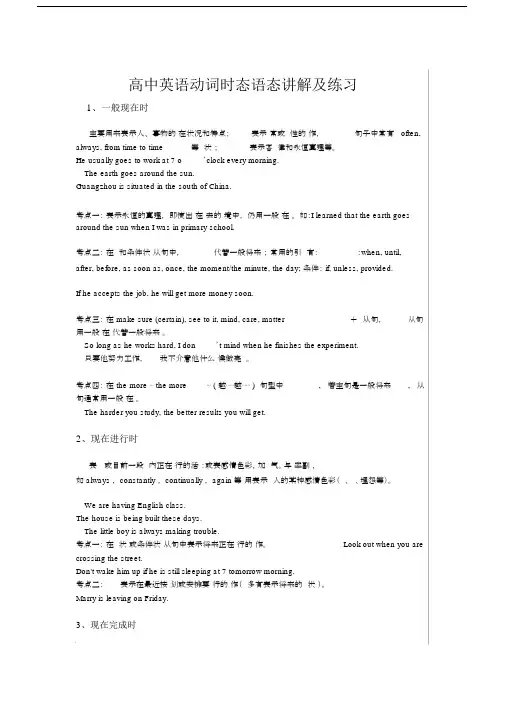
高中英语动词时态语态讲解及练习1、一般现在时主要用来表示人、事物的在状况和特点;表示常或性的作,句子中常有often, always, from time to time等状;表示客律和永恒真理等。
He usually goes to work at 7 o’clock every morning.The earth goes around the sun.Guangzhou is situated in the south of China.考点一:表示永恒的真理,即使出在去的境中,仍用一般在。
如:I learned that the earth goes around the sun when I was in primary school.考点二:在和条件状从句中,代替一般将来;常用的引有::when, until, after, before, as soon as, once, the moment/the minute, the day; 条件: if, unless, provided.If he accepts the job, he will get more money soon.考点三:在 make sure (certain), see to it, mind, care, matter+从句,从句用一般在代替一般将来。
So long as he works hard, I don’t mind when he finishes the experiment.只要他努力工作,我不介意他什么候做完。
考点四:在 the more ⋯ the more⋯(越⋯⋯越⋯⋯)句型中,若主句是一般将来,从句通常用一般在。
The harder you study, the better results you will get.2、现在进行时表或目前一段内正在行的活:或表感情色彩,加气。
完整版高考英语动词时态和语态讲解
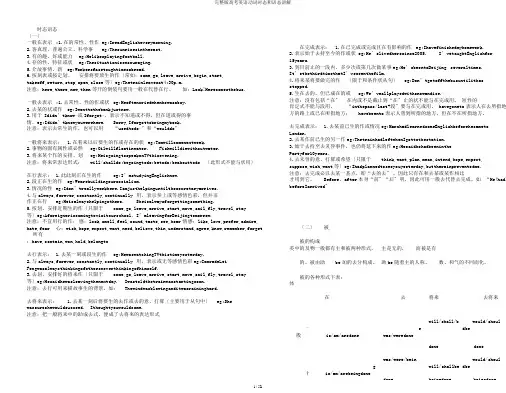
时态语态〔一〕一般在表示:1.在的常性、性作 eg:IreadEnglisheverymorning.2.客真理、普遍公立、科学事eg:Thesunrisesintheeast.3.有的趣、好或能力eg:Helikesplayingfootball.4.存的性、特征或状eg:Thesituationisencouraging.5.介故事情、新eg:Workersfacetoughtimesabroad.6.按刻表或按定划、安排将要放生的作〔常如:come,go,leave,arrive,begin,start,takeoff,return,stop,open,close等〕eg:Thetrainleavesat4:30p.m.注意:here,there,now,then等开的倒装句要用一般在代替在行。
如:Look!Herecomesthebus.一般去表示:1.去常性、性的作或状eg:Heoftencriedwhenhewasaboy.2.去某的状或作eg:Iwenttothebankjustnow.3.用于Ididn’tknow⋯或Iforgot⋯,表示不知道或不得,但在道或得的事情。
eg:Ididn’tknowyouwerehere.Sorry,Iforgottobringmybook.注意:表示去常生的作,也可以用“usedtodo⋯〞和“woulddo〞一般将来表示: 1.在看来以后要生的作或存在的状eg:Tomwillcomenextweek.2.事物的固有属性或必然eg:Oilwillfloatinwater. Fishwilldiewithoutwater.3.将来某个作的安排、划eg:HeisgoingtospeakonTVthisevening.注意:将来常表达形式:will/shalldo;begoingtodo;betodo;beabouttodo 〔此形式不能与状用〕在行表示: 1.此此刻正在生的作eg:I’mstudyingEnglishnow.2.段正在生的作eg:Wearebuildingoursocialism.3.情况的性eg:Idon’treallyworkhere.Iamjusthelpinguntilthesecretaryarrives.4.与always,forever,constantly,continually 用,表示参上或等感情色彩,但并非作正在行eg:Heisalwayshelpingothers. Sheisalwaysforgettingsomething.5.按划、安排近期生的作〔只限于come,go,leave,arrive,start,move,sail,fly,travel,stay等〕eg:Aforeigneriscomingtovisitourschool. I’mleavingforBeijingtomorrow.注意:不宜用行的作:感:look,smell,feel,sound,taste,see,hear情感:like,love,prefer,admire, hate,fear 心:wish,hope,expect,want,need,believe,thin,understand,agree,know,remember,forget 所有:have,contain,won,hold,belongto去行表示: 1.去某一刻或段生的作eg:HewaswatchingTVthistimeyesterday.2.与always,forever,constantly,continually 用,表示或无等感情色彩eg:ComradeLei Fengwasalwaysthinkingofothersneverthinkingofhimself.3.去划、安排好的将来作〔只限于come,go,leave,arrive,start,move,sail,fly,travel,stay等〕eg:Hesaidhewasleavingthenextday. Iwastoldthetrainwasstartingsoon.注意:去行可用来描故事生的背景,如:Thewindwasblowinganditwasraininghard.去将来表示: 1.去某一刻后将要生的去作或去的意、打算〔主要用于从句中〕eg:She wassureshewouldsucceed. Ithoughtyouwouldcome.注意:把一般将来中的助成去式,便成了去将来的表达形式在完成表示: 1.在已完成或完成且在有影响的作eg:Ihavefinishedmyhomework.2.表示始于去持至今的作或状eg:He’slivedher esince2005. I’vetaughtEnglishfor15years.3.到目前止的一段内,多少次或第几次做某事eg:He’sbeentoBeijing severaltimes.It’sthethirdtimethatI’veseenthefilm.4.将来某将要做完的作〔限于和条件状从句〕eg:Don’tgetoffthebusuntilithas stopped.5.生在去的,但已成在的或eg:We’veallplayedwithsnowandice.注意:没有包括“在〞在内或不是截止到“在〞止的状不能与在完成用。
高中英语语法复习讲义+训练:动词的时态(含答案)
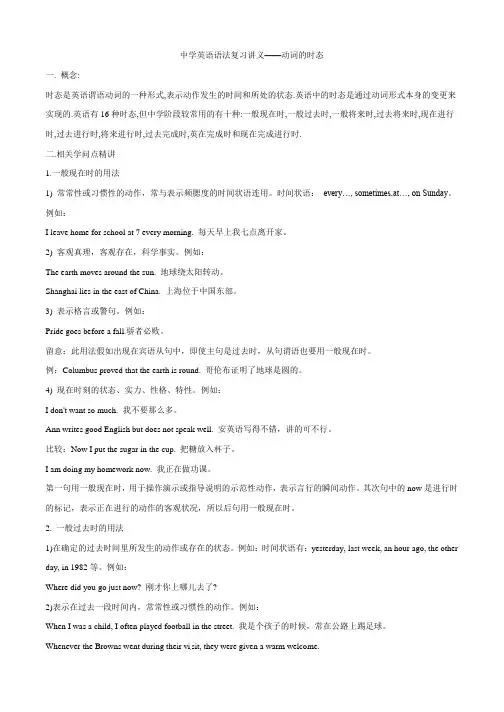
中学英语语法复习讲义——动词的时态一. 概念:时态是英语谓语动词的一种形式,表示动作发生的时间和所处的状态.英语中的时态是通过动词形式本身的变更来实现的.英语有16种时态,但中学阶段较常用的有十种:一般现在时,一般过去时,一般将来时,过去将来时,现在进行时,过去进行时,将来进行时,过去完成时,英在完成时和现在完成进行时.二.相关学问点精讲1.一般现在时的用法1) 常常性或习惯性的动作,常与表示频腮度的时间状语连用。
时间状语:every…, sometimes,at…, on Sunday。
例如:I leave home for school at 7 every morning. 每天早上我七点离开家。
2) 客观真理,客观存在,科学事实。
例如:The earth moves around the sun. 地球绕太阳转动。
Shanghai lies in the east of China. 上海位于中国东部。
3) 表示格言或警句。
例如:Pride goes before a fall.骄者必败。
留意:此用法假如出现在宾语从句中,即使主句是过去时,从句谓语也要用一般现在时。
例:Columbus proved that the earth is round. 哥伦布证明了地球是圆的。
4) 现在时刻的状态、实力、性格、特性。
例如:I don't want so much. 我不要那么多。
Ann writes good English but does not speak well. 安英语写得不错,讲的可不行。
比较:Now I put the sugar in the cup. 把糖放入杯子。
I am doing my homework now. 我正在做功课。
第一句用一般现在时,用于操作演示或指导说明的示范性动作,表示言行的瞬间动作。
其次句中的now是进行时的标记,表示正在进行的动作的客观状况,所以后句用一般现在时。
高中英语动词时态语态讲解及练习
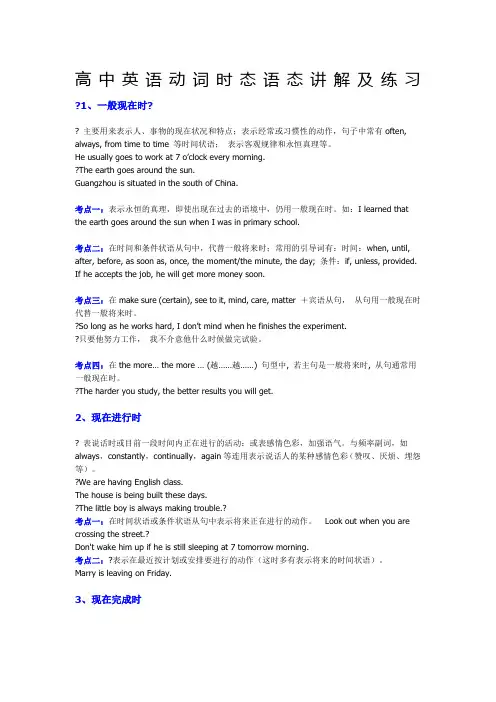
高中英语动词时态语态讲解及练习?1、一般现在时?? 主要用来表示人、事物的现在状况和特点;表示经常或习惯性的动作,句子中常有often, always, from time to time 等时间状语;表示客观规律和永恒真理等。
He usually goes to work at 7 o’clock every morning.?The earth goes around the sun.Guangzhou is situated in the south of China.考点一:表示永恒的真理,即使出现在过去的语境中,仍用一般现在时。
如:I learned that the earth goes around the sun when I was in primary school.考点二:在时间和条件状语从句中,代替一般将来时;常用的引导词有:时间:when, until, after, before, as soon as, once, the moment/the minute, the day; 条件:if, unless, provided. If he accepts the job, he will get more money soon.考点三:在make sure (certain), see to it, mind, care, matter +宾语从句,从句用一般现在时代替一般将来时。
?So long as he works hard, I don’t mind when he finishes the experiment.?只要他努力工作,我不介意他什么时候做完试验。
考点四:在the more… the more … (越……越……) 句型中, 若主句是一般将来时, 从句通常用一般现在时。
?The harder you study, the better results you will get.2、现在进行时? 表说话时或目前一段时间内正在进行的活动:或表感情色彩,加强语气。
最新高中英语动词时态和语态专项练习题附答案

高中英语动词时态和语态专项练习题附答案而语境中的时态和语态具有灵活多变的特点,因此找出隐含于上下文中的时间信息,正确认定动作行为所发生的时间是解题的关键。
做动词时态和语态填空题时,常常按以下几个步骤:(1)注意题干所提供的信息,如语境、情景以及说话人的情感;(2)根据句中的时间状语以及一些副词判断时态;(3)考虑语态;(4)考虑时态的一致性。
另外,复习时,还要涉及到短暂性动词与延续性动词,这两个概念一定要搞清。
短暂性动词用于进行时态和完成时态都要受到限制。
1.(2002全国高考题)—You haven’t said a word about my new coat,Brenda.Do you like it?—I’m sorry I ________ anything about it sooner.I certainly think it’s pretty on you.A.wasn’t sayingB.don’t sayC.won’t sayD.d idn’t say2.(2002全国高考题)I wonder why Jenny ________us recently.We should have heard from her by now.A.hasn’t writtenB.doesn’t writeC.won’t writeD.hadn’t written3.(2003北京春季高考题)—When will you come to see me,Dad?—I will go to see you when you ________ the training course.A.will have finishedB.will finishC.are finishingD.finish4.(2003北京春季高考题)—How long ________ at this job?—Since 1990.A.were you employedB.have you been employedC.had you been employedD.will you be employed5.(2003上海春季高考题)By the end of last year,another new gymnasium ________ in Beijing.A.would be completedB.was being completedC.has been completedD.had been completed6.(2002北京高考题)The little girl ________her heart out because she ________ her toy bear and believed she wasn’t ever going to find it.A.had cried; lostB.cried; had lostC.has cried; has lostD.cries; has lost7.(2002北京高考题)—Excuse me,sir.Would you do me a favor?—Of course.What is it?—I ________ if you could tell me how to fill out this form.A.had wonderedB.was wonderingC.would wonderD.did wonder8.(2002上海高考题)He will have learned English for eight years by the time he ________ from the university next year.A.will graduateB.will have graduatedC.graduatesD.is to graduate9.(2002上海高考题)I feel it is your husband who ________for the spoiled child.A.is to blameB.is going to blameC.is to be blameD.should blame10.He has been writing the composition the whole morning and he still ________.A.has beenB.doesC.hasD.is11.If city noises ________ from increasing,people ________ shout to be heard even at the dinner table 20 years from now.A.are not kept; will have toB.are not kept; have toC.do not keep; will have toD.do not keep; have to12.The price ________,but I doubt whether it will remain so.A.went downB.will go downC.has gone downD.was going down13.—How long ________ each other before they ________ married?—For about a year.A.have they known; getB.did they know; getC.do they know; are going to getD.had they known; got14.You can’t move in right now.The house ________.A.has paintedB.is paintedC.is being paintedD.is painting15.—Hey,look where you are going!—Oh,I’m terribly sorry.________.A.I’m not noticingB.I wasn’t noticingC.I haven’t noticedD.I don’t notice16.The reporter said that the UFO ________ east to west when he saw it.A.was travelingB.traveledC.had been travelingD.was to travel17.—Is this raincoat yours?—No,mine ________ there behind the door.A.is hangingB.has hangC.hangsD.hang18.I turned around and saw everybody ________ at a man who ________ loudly in a foreign language.A.was staring; was shoutingB.was staring; shoutingC.staring; shoutingD.stared; shouted19.Henry remained silent for a moment.He ________.A.thoughtB.had thoughtC.was thinkingD.was thought20.We would like to go and thank him ourselves,but we ________ out his address yet,A.haven’t foundB.hadn’t foundC.didn’t findD.don’t find21.Shirley ________ a book about China last year but I don’t know whether she has finished.A.has writtenB.wroteC.had writtenD.was writing22.—Have you got your test result?—Not yet.The papers ________.A.are not correctingB.have not correctedC.are still being correctedD.have already been corrected23.See the clouds! It ________ rain!A.willB.is going toC.mustD.certainly24.Do I have to take this medicine? It ________ so terrible.A.tastesB.is tastingC.is tastedD.has tasted25.Don’t take the magazine away.It ________ me.A.is belonged toB.belongs toC.was belonged toD.is belonging to26.Is this the third time that you ________ late?A.have beenB.amC.wasD.had been27.—Do you know when Tom ________ from abroad?—Perhaps it will be a long time before he ________.A.will come; will comees; will comeC.will come; comeses; comes28.My uncle said that he would telephone but I ________ from him so far.A.didn’t hearB.hadn’t heardC.haven’t heardD.won’t hear29.The telephone ________ four times in the last hour,and each time it ________ for my roommate.A.has rung; wasB.has been ringing; isC.had rung; wasD.rang; has been30.A storm ________ by a calm.A.is often being followedB.was often followedC.is often followedD.has often been followed31.The pen I ________ I ________ is on my desk,right under my nose.A.think; lostB.thought; had lostC.think; had lostD.thought; lost32.—We could have walked to the station.It was so near.—Yes,a taxi ________ at all necessary.A.wasn’tB.hadn’t beenC.couldn’t beD.won’t be33.A friend of mine returned to his house after a holiday only to find it ________.A.to be brokenB.had broken intoC.was brokenD.had been broken into34.They believed that by using computers the production of their factory ________.A.will greatly increaseB.would greatly increaseC.would be increased greatlyD.will have been greatly increased35.His eyes shone brightly when he finally received the magazines he ________.A.had long been expectedB.had long expectedC.has long expectedD.was long expected36.—Do you like the new pen?—Yes,it ________ very well.A.is writtenB.is writingC.writesD.wrote37.—Oh,it’s you? I didn’t recognize you.—I ________ my hair cut,and I ________ new glass.A.had; was wearingB.have had; am wearingC.had; woreD.have had; wear38.As she ________ the newspaper,Granny ________ asleep.A.read; was fallingB.was reading; fellC.was reading; was fallingD.read; fell39.However hard you ________,you will never succeed in pleasing her.A.tryB.will tryC.should tryD.would try40.—Can I help you,sir?—Yes,I bought this radio yesterday,but it ________.A.didn’t workB.won’t workC.can’t workD.doesn’t work41.—How are you today?—Oh,I ________ as ill as I do now for a very long time.A.didn’t feelB.wasn’t feelingC.don’t feelD.haven’t felt42.When Jack arrived he learned Mary ________ for about an hour.A.had goneB.had set offC.had leftD.had been away43.By this time tomorrow we ________ the machine.A.have repairedB.shall have repairedC.will repairD.would repair44.I don’t think Jim saw me,he ________ into space.A.just staredB.was just staringC.has just staredD.had just stared45.Helen ________ her key in the office so she had to wait until her husband ________ home.A.had left; cameB.has left; comesC.left; had comeD.had left; would come46.—You have left the light on.—Oh,so I have.________ and turn it off.A.I’ll goB.I’ve goneC.I goD.I’m going47.This is Ted’s pho to.We miss him a lot.He ________ trying to save a child in earthquake.A.killedB.is killedC.was killedD.was killing48.The notice ________ “No smoking.”A.is wroteB.readsC.writesD.is read49.Good care must ________ babies particularly while they are ill.A.takeB.take ofC.be takenD.be taken of50.Shortly after we ________,a waiter came over to our table with a smile.A.seatedB.were seatedC.sat ourselvesD.had seated51.—You look pale,what troubled you?—I ________ my dead friend.A.am thinking aboutB.was thinking aboutC.had thought aboutD.will think about52.John and I ________ friends for eight years.We first got to know each other at a Christmas party.But we ________ each other a couple of times before that.A.had been; have seenB.have been; have seenC.have been; had seenD.had been; had seen53.Do make sure that you ________ a seat today!A.gotB.getC.shouldD.have get54.We ________ at the house as we ________ of buying it.A.looked; were thinkingB.were looking; were thinkingC.were looking; thoughtD.looked; had thought55.—I’m told that you are leaving for Beijing.—Who ________ so?A.saidB.had saidC.saysD.has said56.I ________ the room to be empty but found it occupied.A.had thoughtB.have thoughtC.didn’t thinkD.was thinking57.Selecting a mobile phone for personal use is no easy task because technology ________ so rapidly.A.will have changedB.has changedC.is changingD.will change58.I ________ ping-pong quite well,but I haven’t had time to play since the new year.A.will playB.have playedC.playedD.play59.Visitors ________ not to touch the exhibits.A.will requestB.are requestedC.are requestingD.request60.They ________ a snowstorm on their way home.A.caught inB.had caughtC.were caughtD.were caught in高考能力测试步步高英语基础训练8答案基础训练8动词(三)动词时态和语态1~5 DADBD 6~10 BBCAD11~15 ACDCB 16~20 AAACA21~25 DCBAB 26~30 ACCAC31~35 BADCC 36~40 CBBAD41~45 DDBBA 46~50 ACBDB51~55 BCBBC5 6~60 ACDBD【解析】1.用过去时表达没能早说之意。
高中英语动词时态练习题及讲解
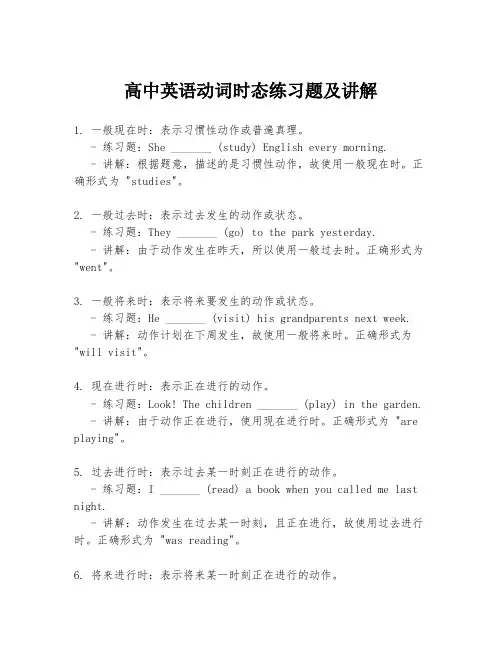
高中英语动词时态练习题及讲解1. 一般现在时:表示习惯性动作或普遍真理。
- 练习题:She _______ (study) English every morning.- 讲解:根据题意,描述的是习惯性动作,故使用一般现在时。
正确形式为 "studies"。
2. 一般过去时:表示过去发生的动作或状态。
- 练习题:They _______ (go) to the park yesterday.- 讲解:由于动作发生在昨天,所以使用一般过去时。
正确形式为"went"。
3. 一般将来时:表示将来要发生的动作或状态。
- 练习题:He _______ (visit) his grandparents next week. - 讲解:动作计划在下周发生,故使用一般将来时。
正确形式为"will visit"。
4. 现在进行时:表示正在进行的动作。
- 练习题:Look! The children _______ (play) in the garden. - 讲解:由于动作正在进行,使用现在进行时。
正确形式为 "are playing"。
5. 过去进行时:表示过去某一时刻正在进行的动作。
- 练习题:I _______ (read) a book when you called me last night.- 讲解:动作发生在过去某一时刻,且正在进行,故使用过去进行时。
正确形式为 "was reading"。
6. 将来进行时:表示将来某一时刻正在进行的动作。
- 练习题:She _______ (be) at a meeting at this time tomorrow.- 讲解:动作将在将来某一时刻进行,使用将来进行时。
正确形式为 "will be"。
7. 现在完成时:表示过去发生的动作对现在有影响或结果。
高中英语动词时态语态精讲及练习
高中英语动词时态语态精讲及练习一、时态(一)现在进行时用法注意点:1.状态性动词不用进行时态,包括(1)be和have,或者含有be 和have意义的动词,如:belong to, cont ain, depend on,等;(2)feel, sound, smell, taste等连系动词;(3)hear, see, find等表示结果的动词;(4)表示心理或情感状态的动词,如:believe, love, want, understan d, wish等;2.进行时态和副词always, forever等连用时,往往带有一定的感情色彩,如颂扬、批判、不满、埋怨等;eg. He is always criticizing us.(二)一样过去时与过去进行时的区别:1.过去进行时表示动作的未完成性、连续性,着眼于动作的过程;一样过去时表示动作的完成,即动作发生过,且已终止,着眼于结果;如:She was writing a report last night and I don’t know if she has fin ished it.(昨晚一直在写)She wrote a report last night.(表示昨晚写了,同时写好了)2.过去进行时与always, forever等词连用表示一定的感情色彩;He was always throwing things about. (表示不满或厌恶)(三)今后时的几种表达:还可用一样现在时、现在进行时表示今后发生的动作;(四)今后进行时与今后完成时:1.今后进行时表示今后某一时刻发生的动作,结构为:will / shall be doing2.今后完成时表示到今后某时刻某动作已发生,结构为:will / shall h ave done,时刻状语为:by+表今后时刻的词语;如:I’ll be climbing the mountain this time the day after tomorrow.By the time he graduates from the college, he will have learned thre e foreign languages.(五)现在完成时及过去完成时的用法注意点:1.瞬时性动词与连续性动词的正确使用:与how long, for, since等表示一段时刻的状语连用时须用连续性动词,如:die-be dead, marry-be ma rried, begin-be on, begin to know-know等;2.注意have been to与have gone to的区别;4.by+过去时刻状语用过去完成时;5.有些动词的过去完成时表示过去未曾实现的意图、打算或期望,这类动词为:think, plan, mean, intend, hope, expect, suppose等;I had intended to visit you yesterday, but the rain prevented me.(六)现在/过去完成进行时的用法:强调动作连续到说话时且还在进行;结构:have (has) / had been doing比较:They have repaired the road.(表示路已修好)They have been repairing the road. (表示路还在修)有时两者可替换:She has taught in this middle school for ten years.She has been teaching in this sch ool for ten years.注意:完成进行时不可与瞬时性动词连用,如:finish, go, marry等;(七)某些固定句型中时态是固定的:1.This / That / It is the first time +从句(用现在完成时)2.It’s / has been +一段时刻+since从句(用过去时)3.It will be +一段时刻+before从句(用一样现在时)/ It was +一段时刻+before从句(用过去时)4. It’s time+从句(用过去时或should do)5.would rather+从句(用一样过去时/过去完成时)It’s getting late. I’d rather you took a taxi there.The film was boring. I’d rather I hadn’t gone to see it.二、语态语态概述英语的语态是通过动词形式的变化表现出来的。
高中英语时态语态专题加练习-附答案
时态语态专题1.时态2.被动语态3.练习一、时态1时态是表示行为、动作和状态在各种时间条件下的动词形式。
常用的时态有:一般现在时、一般过去时、一般将来时、现在完成时、过去完成时、现在进行时、过去进行时、过去将来时、将来进行时、将来完成时。
用法:1.通常表示现阶段经常发生的动作、存在状态或经常的习惯性的动作。
常与often, usually, always, sometimes, today, every five minutes, on Sundays等时间状语连用。
Around two o’clock every night, Sue will start talking in her dream. It somewhat _bothers_(bother) us. 2.表示永恒的真理以及客观事实。
The earth _goes_ (go) round the sun.3.表示按规定或计划要发生的动作。
The train _starts_ (start) at seven in the morning.4.在时间和条件状语从句中代替一般将来时。
常用的引导词:表时间的有when, until, after, before, as soon as, once, the moment/the minute, the day;表条件的有if, unless, provided, as long as.I’ll go with you, if you _are_ (be) free tomorrow.注意:在here, there开头的倒装句中,一般现在时表示正在发生的动作或存在的状态。
(二)一般过去时11.表示在过去某个时间发生的动作或存在的状态。
常与表示过去的时间状语ago, yesterday , last week, in the old days ,when I was five years old, in 1995 等连用。
完整版考点详解版高中英语动词时态语态讲解及练习.doc
表格式一般现在时态和语态一般现在时特点要点内容一般现在时是表示现在经常反复发生的动作存概念标志语谓语动词的时态构成谓语动词语态构成形式温馨提示(重要考点)在的状态或习惯性的动作的时态.often , sometimes , always ,usually 等频率词连用,every day, every week, every month, every term, every year, once a week ,twice a year ,on Sundays,1be 动词的一般现在时:am isare("是 ")2当谓语动词是行为动词的时候:( 1)当主语不是第三人称单数的时候,一般现在时用行为动词的原形(2)主语是 he,she,it等第三人称单数(除去 I,you 以外的任何一个单数的名词或者代词),动词要变形加 s 或 es.(温馨提示:动词变形要符合两个条件: 1,主语是三单, 2,句子是肯定句)am / is /are + 过去分词1表示位置转移的动词 go ,come ,start ,move ,sail ,leave ,arrive ,stay ,live, fly, get 等可用一般现在时表示按计划“即将”发生的动作,2 在时间和条件状语从句中,都可用现在时表示将来时(即主将从现原则 ,一定要有两个句子)【常见主将从现的标志语有if, as soon as( 一⋯就) unless( 如果不when, before, until (直到⋯才)等从句标志语】1 .He (play) football very well.2. Jenny (has) a good friend?3. Brian ( not live) in China.4. Li Ming with me (be) in Beijing.5. If it ( not rain)tomorrow, we will go to the park.6. Our teacher said that the earth (go)around the sun yesterday.7.He(help)the old man every week .8. The old man(help)by him every week.9.The building(visit) by many people every year.一一般现在时(一)定义:主要用来表示人、事物的现在状况和特点;表示经常或习惯性的动作,句子中常有often, always, from time to time等时间状语;表示客观规律和永恒真理等He usually goes to work at 7 o ’clock every morning.The earth goes around the sun. Guangzhou is situated in the south of China.(二)标志词:always, usually, often, sometimes, hardly ever ,every week (day, year, month ⋯ ),once /twice a week, on Sundays,(三)谓语动词构成:1be 动词的一般现在时:am is are("是",“在”)2当谓语动词是行为动词的时候:( 1)当主语不是第三人称单数的时候,一般现在时用行为动词的原形(2)主语是 he,she,it 等第三人称单数(除去 I,you 以外的任何一个单数的名词或者代词),动词要变形加 s 或 es.(温馨提示:动词变形要符合两个条件:1,主语是三单,2,句子是肯定句)(四) .基本结构:1,肯定句:主语+谓语( +其他的)He loves sports.Jane is an outgoing girl.(主语 He 是三单,又是肯定句,所以谓语动词发生变形,加上了s)Tom and Tim both have medium height.He has a big mouth.We like the dog very much.2,否定句:主语+don’t或者doesn’t+动词原形+其他(在 be 或者后面加上do does) Candy doesn’t do her housework every day.We don’t dance .He isn’t a worker.3,一般疑问句:Do (Does)+ 主语 +动词原形 +其他?(把be 或者 do does 提到主语的前面)Does she like English? Yes,she does.No,she doesn’t.Do you swim in summer?Are you a teacher?4,特殊疑问句:疑问词+一般疑问句Where does Tom come from?(五 )一般现在时态用法(1)经常性或习惯性的动作,常与这样的时间状语连用:eg: We always help each other.It often snows in winter. I get up early every morning.(2)表示主语现在的特征、性格、能力等。
高中英语时态及练习
高中英语时态及练习一、一般现在时1、表示现在发生的动作或存在的状态,常与every day,once a week,in the morning,at present等连用。
例:They don’t usually have enough money to go to the movies.2、表示主语具备的性格和能力等。
例:Mary can speak three languages.3、表示经常性或习惯性的动作,常与always,never,sometimes,often等连用。
例:I never eat fast food.4、表示现在提出的建议或要求。
例:Could you please help me with my math homework?二、现在进行时1、表示正在发生的动作或存在的状态。
例:He is studying for his history exam.2、表示现阶段正在进行的动作,但这个动作不一定正在进行。
例:My brother is preparing for his college entrance exams.3、表示即将发生的动作,常与表示将来的时间副词连用。
例:We are about to start our journey.三、现在完成时1、表示过去发生的动作对现在造成的结果。
例:I have just finished my homework.2、表示过去开始一直持续到现在的动作或状态,并可能继续下去。
例:They have been married for 20 years.四、一般过去时1、表示过去某个时间发生的动作或存在的状态。
例:We saw a movie last night.2、表示过去经常或反复发生的动作。
例:He always went to the park in the morning.高中英语时态练习英语时态是英语语法中非常重要的一个部分,也是我们在学习英语过程中必须要掌握的知识。
- 1、下载文档前请自行甄别文档内容的完整性,平台不提供额外的编辑、内容补充、找答案等附加服务。
- 2、"仅部分预览"的文档,不可在线预览部分如存在完整性等问题,可反馈申请退款(可完整预览的文档不适用该条件!)。
- 3、如文档侵犯您的权益,请联系客服反馈,我们会尽快为您处理(人工客服工作时间:9:00-18:30)。
动词时态1.一般现在时(do, does)1)The earth goes around the sun.2) His dog always barks at strangers.3) When his dog barks, he will know that a stranger may come.4) The train leaves at seven tonight.(事实、真理)(习惯性、经常性)(时间、条件状从句)(按规定、时间表)1.Could you tell me if it in winter in Beijing.A. snowedB. snowsC. snowD. will snow2. I need one more stamp before my collection _____.A. has completedB. completesC. has been completedD. is completed时间、条件、程度状语从句中动词的时态在if 、unless等词引导的条件状语从句,when、till/until 、as soon as 、the time等词引导的时间状语从句,以及the more …the more 结构引导的程度状语从句中,当主句中的动词用一般将来时,从句中的动词通常用一般现在时表示将来时间。
2.一般过去时(did)1) The monkey fell down from the tree just now.2) They danced for four years.(过去发生的动作或存在的状态)(过去经常或反复发生的动作)判断正误1、对不起,我没看见你在这儿。
Sorry, I don’t see you here.Sorry, I didn’t see you here.2、我忘了把你的伞带来了。
I forget to bring your umbrella with me.I forgot to bring your umbrella with me.3. 进行时1) It’s snowing.2) He is always telling lies.3) They are leaving for school.a. 现在进行时(is/are/am + doing)go, come, leave 等用现在进行时代替将来时be always / often … doing 表示说话人的态度b. 过去进行时(was/ were + doing)1) She was doing homework this time yesterday.2) He was doing his homework.3) He did his homework.4) He has done his homework.过去在做,不知道有没有完成过去就完成了到现在已经完成了4. 完成时态有时间标志,从过去某个时间开始,一直到现在,并对现在存在影响since, for, before, in the past /last few years …A. 现在完成时(have/ has + done)1) We have learned about 2,000 words since we entered senior high school.2) I have studied English for nearly 10 years.3) Great changes have taken place in Shanghai in the past 10 years.B.过去完成时(had done)1)When he was eight months old, he had learned to drink milk by himself.2)The boy had hoped to pass the exam.3) The lady had intended to hold the vase.had thought/hoped/intended/planned …表示原本打算,但没能实现的C.完成进行时(has/have/had + been + doing)1) They have been doing the experiment all day long.2) He had been doing homework before he went to bed.强调过去某个时间开始,然后一直持续,没有中断一般将来时(1)表示将要发生的动作和状态It is going to rain.(2)表示一种倾向和习惯动作A lion will never attack an elephant.We will die without air and water.(3)常用进行时表将来的动作有come, go, leave, arrive 等,表示不易改变的动作。
Spring is coming.She is leaving for the USA.4. 将来时态将来时的几种用法比较be going toshall / willbe to dobe about to dobe going to表示打算或计划I have bought some bricks and I am going to build a house with them.表示非常可能发生Be careful! You are going to break the chair.不能用在条件从句中If it is fine, we are going to go fishing.willshall / will表意愿I will go to the cinima with you tonight.表事先没有考虑过,说话时临时想到的--- Where is the telephone book?--- I will get it for you.be to do表按安排、计划即将发生的动作,还可表示吩咐、命令、禁止、可能性等。
President Bush is to visit China next month.If you are to succeed, you must work hard.be about to do表即可,就要,后面不能接时间状语,但经常和when 引导的状语从句连用。
The plane is about to take off.I was about to go out when he came in.Ex.改错:Hello, I learn about you from my English teacher.I am happy with one programme but the others spent a lot of time arguing …… I’d like very much to come but I had an examination on Monday morning.As we climed the mountain, we fed monkeys, visiting temples and told stories.learnedhavewasvisited动词时态、语态练习1.I can guess you were in a hurry.You____your sweater inside out.A.had wornB.woreC.were wearingD.are wearing2.-- We _____that you would fix the TV set this week.-- I'm sorry.I _____to fix it this week, but I've been too busy.A.had expected;had intendedB.are expecting;had intendedC.expect;intendD.expected;intend3.He will stop showing off, if no notice _____of him.A.is takenB.will be takenC.takesD.has taken4.--It is said that another new car factory_____now.-- Yeah.It _____one and a half years.A.is building;takesB.is being built;will takeC.is built;will takeD.is being built;takes5.-- I'm sorry, but I shouldn't have been so rude to you.-- You _____your temper but that's OK.A.have lostB.had lost did lose D.were losing6.-- Why? Tom, your shirt is so dirty!-- Mum, I _____my storeroom downstairs。
A.cleanedB.have workedC.was cleaningD.have been cleaning7.They won't buy new clothes because they___money to buy a color TV set.A.saveB.are savingC.has savedD.were saving8.Good heavens! There you are! We___anxious about you, and we ___you back throughout the night.A.are;expectB.were;had expectedC.have been;were expectingD.are, were expecting9.I've finally finished my paper and it _____me an entire month.A.takesB.tookC.was takenD.had taken10.The traffic in our city is already good and it ___even better.A.getsB.gotC.has gotD.is getting11.-- Has Jack finished his homework yet?-- I have no idea;he ___it this morning.A.was doingB.had been doingC.has doneD.did12.-- I will come to attend your lecture at 10:00 tomorrow.-- I'm sorry, by then my lecture will have ended and I___my guests in my office.A.is being metB.will meetC.will be meetingD.will have met13.-- Alice came back home the day before yesterday.-- Really ? Where _____?A.has she beenB.had she beenC.has she goneD.had she gone14.John and I___friends for eight years.We first got to know each other at a Christmas party.But we_____each other a couple of times before that.A.had been;have metB.have been;have metC.had been;had metD.have been;had met15.I ____ping-pong quite well, but I haven't had time to play since the new year.A.will playB.have playedC.playedD.play16.I've won a holiday for two to Florida.I _____my mum.A.takeB.am takingC.have takenD.will have taken17.-- You haven't said a word about my new coat,Brenda.Do you like it?-- I' m sorry I ______anything about it sooner.I certainly think it' s pretty on you.A.wasn't sayingB.don't sayC.won't sayD.didn't say18.-- Where _____? -- I got stuck in the heavy traffic.I _____here earlier.A.did you go;had arrivedB.have you been;would have beenC.were you;would comeD.are you;was19.I know Mr Brown;we ______to each other at an international conference.A.are introducedB.have been introducedC.were introducedD.had been introduced20.--Where do you think_____he____the computer?-- Sorry.I have no idea.A.has ;boughtB./;boughtC.did ;buyD.had ;bought参考答案及解析:1.D。
